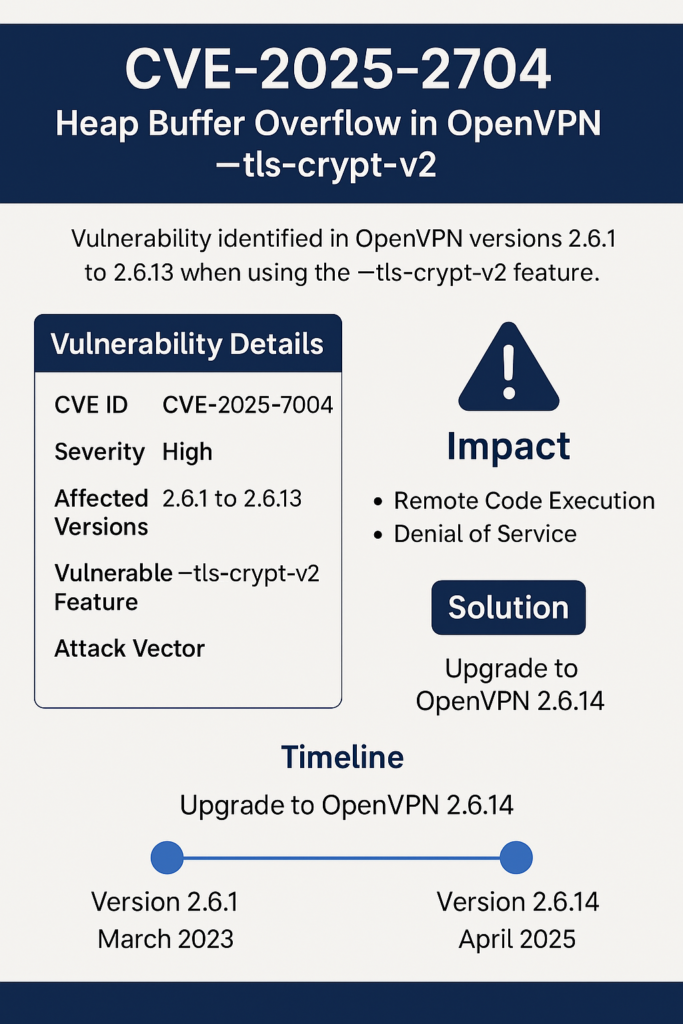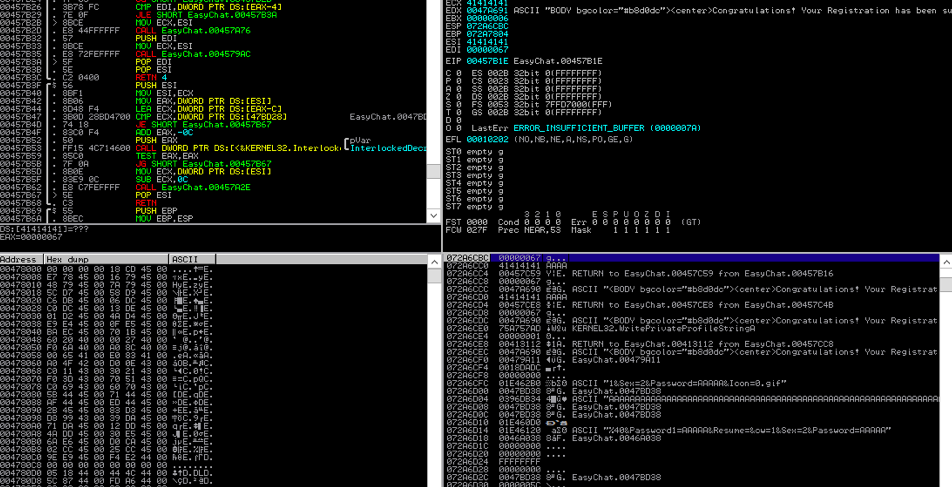Heap Buffer Overflow in OpenVPN -tls-crypt-v2 Feature
A newly disclosed vulnerability, CVE-2025-2704, affects OpenVPN versions 2.6.1 through 2.6.13, specifically when the --tls-crypt-v2 feature is in use. This flaw is categorized as a heap buffer overflow, potentially leading to remote code execution or denial of service (DoS). Given OpenVPN’s widespread use in securing private communications and enterprise VPN infrastructures, this vulnerability poses a significant risk, particularly in high-security environments.
Vulnerability Details
- CVE-ID: CVE-2025-2704
- Severity: High
- CVSS Score (Tentative): 8.1 (High)
- Affected Versions: OpenVPN 2.6.1 to 2.6.13
- Vulnerable Feature:
--tls-crypt-v2 - Fixed Version: OpenVPN 2.6.14
- Attack Vector: Remote
- Impact: Heap Buffer Overflow → Remote Code Execution / DoS
- Prerequisite: Malicious client or server sending crafted packets using
--tls-crypt-v2
Here’s a quick visual summary of CVE-2025-2704:

Technical Breakdown
The root of CVE-2025-2704 lies in the parsing of tls-crypt-v2 metadata. OpenVPN introduced --tls-crypt-v2 as an enhancement over --tls-auth and --tls-crypt, providing encrypted and authenticated control channel protection with unique keying material per peer.
What Went Wrong?
In versions 2.6.1 to 2.6.13, OpenVPN improperly handles the decryption and parsing of control channel metadata when --tls-crypt-v2 is enabled. This results in a heap buffer overflow when overly long metadata entries are sent during the handshake phase. Specifically:
- The metadata buffer length is not properly validated before being used in a memory copy operation.
- An attacker with the ability to send malicious control channel packets (e.g., a client connecting to an OpenVPN server, or a rogue server in a compromised setup) could craft a payload that overflows the heap memory, corrupting adjacent memory or executing arbitrary code.
This can lead to:
- Denial of Service (DoS): Crash of the OpenVPN daemon.
- Remote Code Execution (RCE): In theory, exploitation could allow arbitrary code execution in the context of the OpenVPN process.
Exploitation Conditions
While no public exploit is available at the time of writing, exploitation would require:
- Access to connect to the OpenVPN instance using a TLS-based session with
--tls-crypt-v2enabled. - The ability to craft and send malicious packets during the initial TLS handshake.
- In many deployments, especially in remote-access VPNs, such access might be granted to all clients pre-authentication—making this pre-auth RCE under some configurations.
Real-World Impact
Many organizations deploy OpenVPN for secure remote access, site-to-site tunnels, or within SD-WAN solutions. In any deployment where --tls-crypt-v2 is enabled (typically used to prevent DoS or fingerprinting), this vulnerability could be used by:
- Malicious insiders to escalate privileges.
- Rogue devices on untrusted networks to compromise VPN servers.
- Sophisticated attackers to gain footholds in otherwise hardened environments.
Notably:
- The vulnerability does not require valid credentials, making it especially dangerous in unauthenticated configurations.
- Systems running OpenVPN as a privileged service (e.g., root) are at higher risk of severe impact.
Mitigation and Remediation
Recommended Actions:
- Immediate Upgrade to OpenVPN 2.6.14 or later.
The latest version includes the patch that fixes the unsafe memory handling during TLS metadata parsing. - Disable
--tls-crypt-v2temporarily if an upgrade cannot be performed immediately and the feature is not critical. - Isolate OpenVPN instances from untrusted networks if possible. Limit access to trusted IPs.
- Implement monitoring and intrusion detection to catch suspicious TLS handshake anomalies.
- Review OpenVPN privileges:
Run OpenVPN as a non-root user whenever feasible, with capability constraints using tools likecapshor systemd sandboxing.
Detection and Threat Hunting
Look for anomalous TLS handshake failures or crashes in OpenVPN logs:
grep 'TLS error' /var/log/openvpn.log
Monitor for unexpected restarts of the OpenVPN service and abnormal memory usage. Tools like auditd or syslog-ng can help flag repeated handshake attempts with malformed payloads.
Final Thoughts
CVE-2025-2704 reminds us that even battle-tested tools like OpenVPN are not immune to subtle, yet impactful memory management flaws. This vulnerability is especially critical because it strikes before authentication—an area often overlooked by defenders focusing solely on post-auth security.
Organizations relying on OpenVPN should prioritize patching immediately, especially in high-assurance or regulated environments. As the attack surface widens with remote work and cloud-first models, pre-auth flaws in VPNs represent an increasingly attractive target for adversaries.
References
- OpenVPN Security Advisory – April 2025
- GitHub Commit Fixing CVE-2025-2704
- CVE Details Page – CVE-2025-2704
- OpenVPN Documentation: –tls-crypt-v2


Leave a Reply